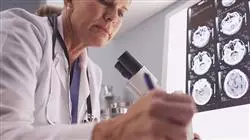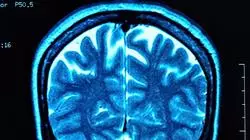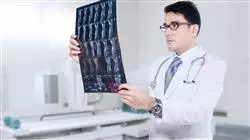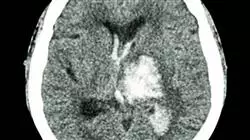University certificate
The world's largest faculty of medicine”
Description
The new scenarios in Radiology today push us to propose new training programs that fit the real needs of experienced professionals, so that they can incorporate the advances in the field of Diagnostic Neuroradiology to their daily practice"

Neuroradiology is a radiological subspecialty that has experienced great advances in recent years. Rapid and accurate diagnosis is essential for the management of stroke patients. Likewise, the aging of the population and their lifestyles have increased the prevalence of these ischemic processes, as well as dementias. In this course we develop an "update" of the most important neurological processes, starting with cerebrovascular disease, trauma, demyelinating diseases, dementia and neurodegenerative diseases, malformations and spinal cord and CNS tumors.
The program includes the most important areas of Neuroradiology organized by organs and systems, including aspects of daily practice, such as the importance of the radiological report and its legal implications, as well as the most frequent entities where Radiology has a fundamental role (head and neck, thorax, abdomen, musculoskeletal and women's Radiology).
Additionally, the postgraduate certificate is completed with a module of management in Radiology, with topics of organization, PACS, RIS, teleradiology, the importance of the radiological report, as well as the legal implications of our actions. It also includes a module on "topical issues" such as imaging biomarkers, dual-energy CT and multiparametric studies in Radiology.
You will be able to learn, through the latest educational technology, the latest advances in Diagnostic Neuroradiology"
This postgraduate certificate in Diagnostic Neuroradiology contains the most complete and up-to-date scientific program on the market. It’s most outstanding features are:
- Clinical cases presented by specialists in Radiodiagnostics and other specialties
- The graphic, schematic, and practical contents with which they are created, provide scientific and practical information on the disciplines that are essential for professional practice
- Real high-resolution images of pathologies, diagnostic imaging tests and guided procedures
- Presentation of practical workshops on procedures and techniques
- An algorithm-based interactive learning system for decision-making in the clinical situations presented throughout the course
- Action protocols with the most important advances in Diagnostic Neuroradiology
- All of this will be complemented by theoretical lessons, questions to the expert, debate forums on controversial topics, and individual reflection assignments
- Content that is accessible from any fixed or portable device with an Internet connection
This postgraduate certificate is the best investment you can make when selecting a refresher program, for two reasons: in addition to updating your knowledge in Diagnostic Neuroradiology, you will obtain a postgraduate certificate issued by TECH Global University"
The teaching staff includes a team of leading Radiologists who bring their professional experience to this program, in addition to renowned specialists in other medical areas.
The multimedia content developed with the latest educational technology will provide the physician with situated and contextual learning, i.e., a simulated environment that will provide immersive training programmed to train in real situations.
This program is focused on Problem-Based Learning, whereby the specialist must try to solve the different professional practice situations that arise during this training. This will be done with the help of an innovative interactive video system created by renowned experts in the field of Radiology with extensive teaching experience.
Incorporate the latest developments in Diagnostic Neuroradiology to your medical practice and improve patient prognosis"

It includes clinical cases and real images in high definition to bring clinical practice as close as possible to the development of the program"
Objectives
The main objective is oriented to allow the incorporation of the advances that are taking place in the approach of Diagnostic Neuroradiology procedures, trying that the specialist can update his knowledge in a practical way, with the latest educational technology and adapting the educational process to their real needs.

This refresher program will provide you with the skills required for confident decision-making during the diagnostic process, and will help you to grow professionally"
General Objective
- Update the knowledge of the specialist physician in the procedures and techniques performed in the process of diagnosis of neurological disease, incorporating these latest advances in the discipline to increase the quality of their daily medical practice and improve the patient's prognosis
Specific Objectives
- Know the way in which to manage a Radiology department
- Revise the importance of radiological information and the evolution towards a structured report
- Analyze the medical-legal implications in radiological practice
- Recognize radiological advances in cerebrovascular disease and protocolize the radiologist's actions in the code stroke
- Analyze the image findings in craniocerebral trauma
- Identify the MR semiology of demyelinating diseases and evaluate the response to treatment
- Describe the radiological findings in dementia and neurodegenerative diseases
- Know the basic concepts of cerebral malformations and evaluate the types of hydrocephalus
- Evaluate infectious diseases with neuroaxis involvement
- Recognize the pathological signs of the hypothalamic-pituitary axis
- Evaluate CT and MRI findings of CNS neoplasms
- Know the different evaluation systems for the response to treatment in CNS neoplasms
- Discriminate between treatment response, pseudoresponse, pseudoprogression and disease progression
- Analyze the findings of diagnostic radiology techniques in ophthalmologic pathology
- Describe the radiological semiology of skull trauma
- Identify the signs in different radiological techniques for use in nasosinusal pathology
- Know how to stage pharyngeal and laryngeal neoplasms radiologically
- Know how to establish and recognize the biomarkers in imaging
- Perform a dual-energy CT and multiparametric studies in radiology

Take the step to get up to date on the latest developments in Diagnostic Neuroradiology”
Postgraduate Certificate in Diagnostic Neuroradiology
Numerous disciplines arise from the medical field focused on treating organs and/or specific pathologies of the body; one of those specialties is radiology, used to generate internal images of the body. With the evolution in technological and scientific matters, this area has had significant advances that allow diagnosing and characterizing abnormalities of the central and peripheral nervous system, spinal cord, head and neck. For this reason, it becomes necessary that the health personnel dedicated specifically to this medical branch, renew their knowledge with the purpose of knowing the new techniques and indications used. Given this scenario, TECH Global University designed a Postgraduate Certificate in Diagnostic Neuroradiology that, in addition to addressing the computer advances involved in the radiographic process; includes in his academic curriculum the methodology of the multiparametric studies used in each procedure. Through the latest educational technology, students will be trained to apply this subspecialty to efficiently detect cerebrovascular diseases (stroke), trauma, malformations, spinal cord tumors, dementia, CNS neoplasms, and neurodegenerative and demyelinating diseases.
Specialize in the radiodiagnostic field
Neuroradiology is a radiological subspecialty that has experienced great advances in recent years, therefore, this program includes the most important areas of this systematically organized discipline. At TECH we offer you the latest academic advances created with a multidisciplinary approach, due to this, you will be able to include the most innovative tools in your daily praxis that will contribute to your professional improvement. By completing this postgraduate Postgraduate Certificate, which lasts six weeks, you will learn about all the scientific progress in this field. The agenda includes relevant aspects such as the importance of the radiological report and its medical-legal implications when treating the most frequent parts where it is applied (head, neck, thorax, abdomen, musculoskeletal). In addition, it covers essential topics ranging from the organization of PACS (image archiving and communication system), dual energy CT and imaging biomarkers; to multiparametric studies and bioengineering belonging to the radiodiagnostic sector. Go ahead and take this virtual program designed with the highest academic quality; upon completion, you will be fully qualified to work as an interventional radiologist in different clinical sectors.







